notwithstanding the fact that the National Committee was in full sympathy with the single standard gold element, Mr. Welty won his case and seated his delegates. This was not the first time Mr. Welty had identified himself with the friends of silver. When a delegate to the National Convention in 1892, he opposed the nomination of Mr. Cleveland for the Presidency solely on account of the latter's pronounced hostility to silver. In 1897 he was a strong candidate for the nomination for Governor of Ohio in the State Convention . at Columbus, and many of his friends entertained no doubt that he would have been the choice of a large, majority of the delegates, had he not withdrawn. He, however, declined to be placed before the convention, as in his judgment the perfect harmony of the party was pre-eminently desirable that year, when an unusually stubborn fight was anticipated all along the line, with a good chance for a Democratic victory. Mr. Welty is interested in many local enterprises of great 'importance, and has always the welfare of his fellow citizens at heart.

Wallace D. Yaple, Among the chief executives of the Ohio municipalities none enjoys a larger popularity than Mr. Wallace D. Yaple, Mayor of the flourishing city of Chillicothe, the first capital of Ohio. Mr. Yaple is a native of the Buckeye State, being born on the 2d of May, 1870, in Eagle Township, Vinton County. His, parents were William Ross Yaple and Elizabeth McDonald Yaple. Mayor Yaple comes from Revolutionary ancestry, his great-grandfather, John Yaple, having fought on the battlefield of the American struggle for freedom in Washington's army. He, with four other associates, at the end of the Revolutionary War, founded the pity of Ithaca, New York. John Yaple left Ithaca in 1813 and came to Ohio. The father of Mayor Yaple, William Ross Yaple, was born in Ross County, in October, 1833. Wallace D. was the oldest son of his parents. He was educated in the public schools, and after the death of his father, in 1887, taught school for a period of several years. But the profession of a teacher did not satisfy his ambitions. After a couple of years of teaching Mr. Yaple came to Cincinnati, where he read law in the office of his uncle, Judge Alfred Yaple. On the 6th of December, 1894, Mr. Yaple was admitted to the bar before the Supreme Court of Ohio. Immediately afterwards he came to Chillicothe, where he has practiced ever .since, and soon became an important factor in the political life of that city. He was elected City Solicitor of Chillicothe in April, 1897, having the largest majority of any man on the city ticket. He filled his office with such distinction that he was re-elected to the same position in 1899, being the only Democrat elected on the entire city ticket, the other Democratic candidates being defeated by majorities ranging from 200 to 400. In April, 1901, when he was first elected Mayor, there were four candidates in the field; Mr. Yaple, the Democratic candidate ; the
- 575 -
regular Republican candidate, an Independent candidate, and finally an Independent "Reform" candidate. Mr. Yaple was triumphantly elected by a majority of 137. In April, .1903, after the new code for the Ohio cities took effect, Mayor Yaple was re-elected for a second term, this time by ..a majority of 859, the largest majority any candidate for any office ever had in that city. During the centennial celebration of the admission of Ohio into the Union as a State, held in Chillicothe in May, 1903, Mayor Yaple represented his city, the first capital of the State, in the exercises. Mr. Yaple has been a member of the Democratic - Executive. Committee of Ross County for the past six years, and was Chairman of said committee for 1903, having been Secretary in 1898 and 1900. At the Congressional Convention held at New Lexington, Ohio, for the Eleventh Congressional District, in May, 1904, Mayor Yaple was selected as one of the delegates to the Democratic National Convention held at St. Louis, and at said convention he was chosen by the Ohio delegation to represent the State of Ohio on the Committee on Credentials. On the 29th of June, 1903, he was married to Miss Ada Blankenship, daughter of Mr. Valentine Blankenship, of Chillicothe, Ohio:
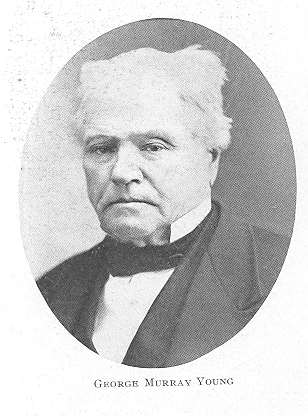
George Murray Young, Was born in Litchfield County, Connecticut, on the 1st of April, 1802. He was of Scotch-Irish descent, his grandfather, Dr. Hugh Murray Young, having been an early Irish emigrant to that State, forced to take refuge there on account of his participation in the Robert Emmett rebellion. He was educated at. Exeter and Poughkeepsie academies, and then, learning the trade of a printer, carried on business for a time as a printer and publisher. In 1826 he marriel Sibel Green, daughter of Benjamin Green, of Lyme, New Hampshire, and granddaughter of Colonel Ebenezer Green, a Revolutionary soldier.
In 1835 he moved with his family to Ohio and located at Newark, where for ten years he was extensively engaged in mercantile pursuits. In 1840 he was the Whig candidate of Licking :County for State Senate, and in the face of a strong Democratic majority ran several hundred ahead of his ticket, and came within forty votes of an election., In 1845 he went to Cincinnati. In 1851 he moved to Dayton, and in 1854 was elected Mayor of that city, and re-elected in 1855, and was subsequently appointed United States Commissioner, an office which he held until his death. His wife, Sibel Green Young, died in Dayton in 1865. He was Grand Worthy Patriarch of the Sons of Temperance when that order numbered thirty thousand in Ohio. In politics: he" was a Whig, and subsequently a Republican. During the war he was a staunch Union man. He was a prominent member of the Presbyterian Church, and was at all times, and in whatever community he resided, honored and respected for his integrity and strength of character. His natural abilities were of the highest order,
- 576 -
and would have made him conspicuous as a. leader, and his ambition called him to more important positions in public life. Modest and retiring in his manners, he was, nevertheless, when aroused a man of great executive ability. Clear and strong in his convictions of.right and duty, he defended his principles with a zeal and persistency which knew no fear and would accept no compromise. He was a ready writer and forcible speaker, a great reader, and thoroughly informed in politics, history and general literature, proud of his New England origin, and an admirer of the Puritan character. He died at Dayton, August 30th, 1878.
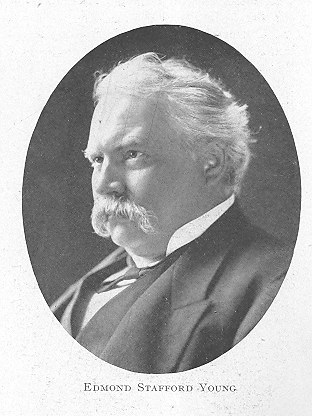
Edmond Stafford Young, Son of George 1 array Young, was .one of the ablest members Of the Dayton bar, a prominent citizen of that city, and ow of the foremost lawyers of the State. He was born at Lyme, New Hampshire, on the. 28th of February, 1827. He attended college at Granville, Ohio, and afterwards at Cincinnati, graduating from Farmers (afterwards Belmont) College, near that city, in 1845. At the latter institution he had among his schoolmates the late ex-President Benjamin Harrison, Murat Halstead, Hon. L. B. Gunckel and the late judge Henderson Elliott, of Dayton. He .read law in. the office of W. 3. McKinney, of Dayton, and after a term of service in the office of the Clerk of the Court of Montgomery County, Ohio, graduated from the Cincinnati Law School, and was admitted to the bar in the year 1853.
Mr. Young's professional partners were, successively, George W. Brown, Hon. D. A. Houk and Oscar M. Gottschall, with the latter of whom his partnership continued from 1866 until 1879. In 1878 his eldest son, George R. .Young, was admitted to the firm, which, under the name of Young, Gottschall & Young, continued until the year 1879, when Mr. Gottschall retired. Mr. Young and his son remained together in the practice trader the firm name of Young & Young until his death in 1888.
In September, 1856, at Philadelphia, Pennsylvania, Mr. Young married Sarah B. Dechert, daughter of Elijah Dechert, a prominent lawyer of Reading, Pennsylvania, and granddaughter of judge Robert Porter, of that city. Her mother, Mary Porter Dechert, was descended from Robert Porter, a native of Ireland, who came to Londonderry, New Hampshire, and afterwards moved to Pennsylvania, where he took up his permanent residence. His most successful and prominent son (Mrs. Dechert's grandfather) was General' Andrew Porter, who served with distinction as an officer during the Revolutionary War. After its close he was commissioned Major General of militia in Pennsylvania, and was tendered the position 'of Secretary of War by President Madison, but declined. His son, Judge Robert Porter, of Reading, Pa., was born January loth, 1878, and served during the latter part of the War of the Revolution as a. Lieutenant of Artillery. Having entered the army with his father when but 11 years of age, he was perhaps the youngest soldier and officer of the war.
- 577 -
Edmond Stafford Young was a strong Union man and an earnest supporter of President Lincoln's administration. He was appointed by Governor Brough, Commissioner of the Draft of Montgomery County, and made the largest draft of any in the State. He also served as a member of the Military Committee, and was identified with the organization of all the local companies raised in Dayton and its vicinity.
Mr. Young was a member of the first non-partisan Police Board of Dayton, appointed in 1873, by which the present metropolitan police system of that city was inaugurated. He was also one of the founders of the Dayton Bar Association, now known as the Dayton Law Library Association.
During the course of his practice he was frequently urged to accept a judicial position, but declined. He was a member of the Ohio State Bar Association, and also of the American Bar Association. He died suddenly on the evening of February 14th, 1888, while still in the active practice of ,lais profession, leaving his widow, Sarah Dechert Young ; two sons, George R. and William H. Young, and one daughter, Mary (a girl of most lovable traits and marked intellectuality, who died on the 13th of August, 1895), surviving.
Mr. Young was a man of striking physical appearance, and of marked mental characteristics. He was born to be a lawyer. His breadth of intellect, his strong, determined will, his sound, impartial judgment, his remarkable reasoning powers, his gift of nice and correct discrimination, made up a mental organization distinctively legal ; while, at the same time, his large and well proportioned head, with its high, expansive forehead, set firmly on his broad, square shoulders, gave him a personal appearance in keeping with his mental characteristics. He was a strong and pure type of that class of American lawyers, who, eschewing outside schemes for the promotion of wealth or personal aggrandizement, devote to their profession the full measure of their powers, and seek happiness in the conscientious discharge of their professional, domestic and civic duties.
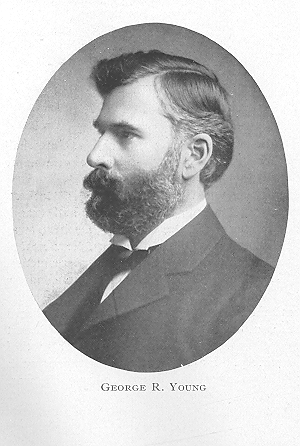
George R. Young, Eldest son of Edmond Stafford and Sarah Dechert Young, was born at Dayton, Ohio, on the 2d of October, 1857. He was educated in the public'schools of that city, graduating from Central High School in . June, 1875, with highest honors, winning a gold medal for scholarship. For a time he pursued classical studies and German under private tutors, and then read law in the office of Young & Gottschall, until his admission to the bar. in April, 1878. He was admitted by the . court (after passing on the question of his eligibility) some months before he reached his majority, and was probably at the time the youngest attorney in the State. Shortly after his admission he entered the firm of his father, which then became Young, Gottschall & Young, and so continued until Mr. Gottschall retired, in 1879. The firm then became Young & Young. Upon the death of his father, Edmond Stafford Young, in 1888, George R. Young at once
- 578 -
formed a partnership with his brother, William H. Young, under the same name of Young & Young, which still continues.
Mr. Young has never held official position. In 1881 he was nominated by the Republican party, while in the East, and without his request or knowledge, for Prosecuting Attorney against the Hon. John M. Sprigg, then running for third term. He returned only two weeks before election, but Mr. Sprigg's majority against him, although the county was largely Democratic, was only 240. In 1885 he received the Republican nomination for City Solicitor, but, the city being then Democratic, he was again defeated by a small majority. Since this time he has never been a candidate for political office, attending strictly to the practice of his profession and giving it all hiss time and attention, and he has met with marked and well merited success. He has taken a leading part in the trial of many important cases, and is recognized by the profession both as a sound and able lawyer and as an advocate of superior ability.
In 1894 he was unanimously recommended by the Montgomery County Bar for the position of Circuit Judge, to succeed Hon. John A. Shauck, elected to the Supreme bench, but withdrew his name before any appointment was made by the then Governor McKinley, owing to lack of time to arrange to give up his extensive practice. He has been for years a trustee of the Dayton Law Library Association, and is a member of the Ohio State and American Bar Associations. He is unmarried.
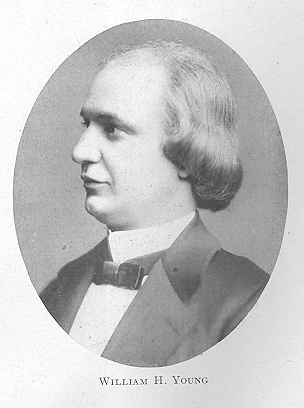
William H. Young, Second son of Edmond Stafford Young, was born March 2, 1860. He attended the public schools of Dayton, and later read law in the office of Young & Young, a firm composed of his father and brother. After his admission to the bar in 1884 he entered the offices of Young & Young, and at the death of his father on' the 14th of February, 1888, he and his brother formed a partnership under the same name, which still continues.
Mr. Young is a Republican in politics, and has usually taken an active part in campaign work. Although he has never held or sought political office, his name has been frequently mentioned in connection with the Congressional nomination and other honorable positions. He has attained quite a reputation for eloquence as a speaker, is an effective stumper and jury advocate, and holds an enviable position at the bar as an able and successful lawyer. He is unmarried.
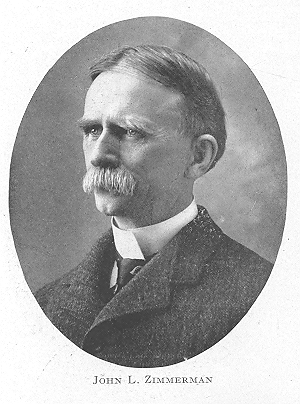
John L. Zimmerman, Attorney at law at Springfield, Ohio, is a popular Democrat in the State. He is a native of Ohio, being born, bred and educated within the boundaries of the Buckeye State. His life has been a series of successes, and to-day he is one of the largest legal practitioners in Clarke
- 579 -
County, owns wide business interests and is a citizen of whom the people of his native city look upon with the highest esteem. During all of his active life he has been a Democrat, closely identified and associated with the different political organizations of that belief, and never since he entered the political arena has there been a campaign in which he has not done some substantial good and made his activity felt in some manner. Mr. Zimmerman was .born near. Washingtonville, Mahon ing County, on a farm, being a descendant of the pioneer families of Ohio, his great-grandfather having moved to Columbiana County in 1803. He lived on this farm until .seventeen years of age, and his early education was obtained in the country schools. He taught school in the winter of 1874, following which he attended Mt. Union College. In the fall of 1875 he entered Wittenberg College, Springfield, Ohio, from .which institution he was graduated with honors in 1879. The following two years he read law with Judge J. K. Mower, and in October, 1881, was admitted to practice before the Supreme Court of Ohio. On the 1st of May, 1882, Mr. Zimmerman began the practice of law in Springfield, Which he has continued uninterruptedly to this date. He has twice been elected President of the Clarke County Bar Association, which is a good index to his high standing as a lawyer. In all the years he has been prominent in politics, he has never been a candidate for public office save twice, once when he was candidate for Congress in the Seventh District against Walter Weaver, and in 1903, when his name was prominently mentioned for the position of Governor of the State of Ohio. For eighteen years he has been a member of the Board of Directors of Wittenberg College, part of the time serving as President of that Board. He has also been a director of the Warder. Free Library, Springfield, Ohio, for a period of fifteen years, and is ex-President of the National Improvement League of America, an institution with a hundred thousand affiliated members, which is wielding large influence in beautifying cities, villages and hamiets throughout the United States. Chief among his public benefactions is the donation to Wittenberg College of the Zimmerman Memorial Library, constructed and presented nine years ago. It is a splendid structure, and is viewed with admiration by all. Atm visit the college. Mr. Zimmerman was a liberal contributor to the building of the Masonic, K. of P. and I. O. O. F. Homes, he being a member of the two former organizations. He has given to Springfield four of its most substantial business blocks—the Zimmerman Building on Main Street, Citizens' National Bank Building, the three-story structure at No, 7 West Main Street, and the five-story new Zimmerman Building on the corner of Main and Limestone Streets. He is a director and one of the organizers of the Citizens' National Bank ; Vice President of The E. W. Ross Company, which employs a large force of men in the manufacture of feed cutters, and Vice President of The D. Q. Fox Company, wholesale grocers. In 1889 he was married to Miss
- 580 -
Helen E. Ballard, a daughter of one of the representative families of the city. Two promising sons, Charles Ballard and John L., Jr., are the result of this union. Mr. Zimmerman is devoted to his home, and never is he happier than when in the society of his own family.
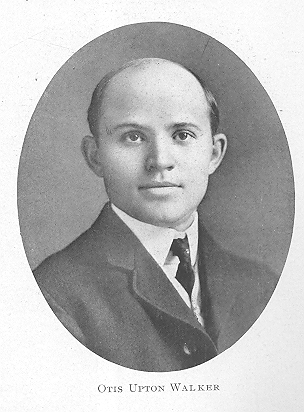
Otis Upton Walker, Who is now serving his third term as Mayor of the thriving city of Alliance, Stark County, Ohio, was born in the village of Ragersville, Tuscarawas County, Ohio, on the 9th day of January, 1874, being the eldest child of Edward S. and Wilhelmina (Neff) Walker and descended from sturdy Colonial stock, which fought in the War for Independence and afterward endured pioneer hardships in the then new land of Ohio. Asher Walker, one of his great-great-grandfathers, was born of English parentage in the colony of New Jersey in 1758, was a soldier in the Revolutionary War, and later moved to Western Pennsylvania, thence to Ragersville, where he died in 1842. One of his grandsons, Samuel P. Walker, married a grand-daughter of Martin Garver, who had settled near Ragersville in the early days of the nineteenth century, and whose father, Christian Garver, or Gerber, had emigrated from Northern Switzerland to the colony of Maryland in 1730. Samuel P. Walker accumulated a competence in agricultural pursuits, and was a man of wide influence. As an officer in the Quartermaster's department during the Civil War he traveled over a wide range of country securing horses for the army, thus becoming well known through a large part of the State. He was the father of fourteen children, one of whom was Edward S. Walker, father of the subject of this sketch.
Edward S. Walker was born near Ragersville on the 18th of November, 1849. He received a common school education and learned the trade of harness making. In the fall of 1870 he was married to Wilhelmina Neff, daughter of Jacob and Christina Neff, well-to-do Scotch-German residents of Tuscarawas County. To this union there were born three children : Otis U., in 1874; Torry S., in 1875, and Marne F., in 1876. The family moved in 1881 from Ragersville to Berlin, Holmes County, where Mr. Walker engaged in business for two years. His health becoming much impaired, they then moved to a farm near Garrettsville, Portage County, where they resided about four years, when they located in Marlboro, Stark County, where he engaged in the hotel and harness 'business until the death of Mrs. Walker, after which he gave his attention to the harness business alone. His good wife, who was a type of gracious Christian womanhood, died on the 4th of April, 1902. Her death no doubt was hastened by her grief over the tragic death of her noble son Torry, who was instantly killed on the 6th of April, 1901, by the explosion of a chemical engine in the Alliance Fire Department, of which he was a member. Though she was in comparatively good health at the time of the terrible accident, she was laid to rest by the side of her
- 581 -
beloved son, in the Marlboro cemetery, on the first anniversary of his death. Mame F., only sister of Otis U. Walker, is the wife of Sherwood Austin, of Marlboro.
Otis U. Walker was about twelve years of -age wherFhis parents took up their residence in Marlboro, and there he continued his educational discipline in the public schools, receiving a certificate to teach school at the age of sixteen, and graduating from the High School with the class of 1893. Even as a boy, he manifested the spirit of self-reliance and determination which are his dominant characteristicS to-day. At the .age of thirteen he apprenticed himself to learn the barber trade, at which he soon became proficient, and through which he paid his own expenses while in the High School. In the summer of 1893, with a view to completing a course in Mt. Union College, he came to Alliance and opened a barber shop near the college, by conducting which he acquired the funds with which to meet the expenses of his collegiate course, which he followed out while devoting himself to the work of his trade. Notwithstanding the arduous nature of his labors in the shop, he applied himself with such enthusiasm and assiduousness to his studies that he was able to complete the regular four years' scientific course in three years, being graduated with the class of 1896 with the degree of Bachelor of Science. While in college he was exceptionally popular with the students, and was chosen for various positions of responsibility. Thus he was manager of the basket-ball and foot-ball teams, periodical reader in the annual literary society cdntests, an officer in the cadet corps, Captain of the Republican Marching Club, editor of "The Dynamo," the college monthly, and of "The Unonian," the college annual, the last named being considered the highest honor of the Senior year.
After his graduation Mr. Walker was employed as city editor of the Alliance Daily Leader, in connection with which he did special work for the Cleveland Leader. While actively engaged in newspaper work, he devoted his evenings to the reading of law, having as a preceptor William L. Hart, of Alliance, one of the representative members of the bar of Stark County. To these two lines of work he was giving his attention at the time war was declared against Spain, when he responded to the call of duty and patriotism by enlisting, in June, 1898, as a private in Company K, Eighth Ohio Volunteer Infantry, known as "McKinley's Own," which was recruited largely in Stark County, the home of President McKinley, and took an honorable part' in the campaign of Santiago de Cuba. In the midst of the campaign he was stricken with a tropical fever, and for weeks his life hung in the balance, his being saved to years of further usefulness being accomplished largely through the great fraternal devotion of his' brother Torry, who was a member of the same company, and who, with the heroism of a generous heart, carried his brother upon his back from the low ground, where he had been left by an overworked hospital corps, to higher ground, and placed him beneath the shelter of a large tree, out of the broiling sun and treacherous damp. Owing to the crowded condition of the regimental hospital, Upton was nursed the greater part of the time by his brother in their own tent, and he made such a brave fight aga,inst the disease, which was claiming hundreds daily, that, in spite of the scarcity of proper food, water and medicine, he again became able for light duty before leaving the island. However, for many months after returning home he was incapacitated by weakness from returning to work. The regiment was mustered out at Wooster, Ohio, on the 21st of November, 1898.
After he had sufficiently recuperated his health, Mr. Walker again engaged in newspaper work, first returning to his old position on the Alliance Leader, then serving on the reportorial staff • of the Pittsburg Times for several weeks for the purpose of gaining certain practical knowledge of the newspaper business which he could not secure in Alliance, and then identifying himself with the Alliance Daily Review. He was thus employed when, in the
- 582 -
spring of 1900, the Republicans of Alliance nominated him for the office of Mayor, and he was elected by a gratifying majority. He was but twenty-six years of age at the time, and both the nomination and election were won over men of mature age and experience. Of his initial administration as Mayor another publication has spoken as follows :
"In the administration of the affairs of the city and in the performance of the duties of his office, Mayor Walker gave such general satisfaction and won such general approval, that the people, almost regardless of party affiliation, rallied to his. support for his re-election, and in the spring of 1902 he was given a majority even greater than when he was first elected to the office."
In 1903 the new municipal code of Ohio went into effect, necessitating a new election for. all municipal offices throughout the State. Mr. Walker, having served but one year of his . second term, again became a candidate, and at this election received the extraordinary honor of having the largest vote ever given any candidate for any office at any election ever held in the city. Thus he is now serving his third term as chief 'executive of Alliance.
On the 23d day of April, 1902, Mayor Walker was united in marriage to Miss Margaret Matthews, a popular and accomplished young lady, the daughter of David and Mary A. Matthews, of Alliance. Her father was born in Wales and came to America in his youth, while her mother is a native of Portland, Maine. Mr. Matthews was Superintendent of the foundry department of the Morgan engineering works at Alliance for nearly. twenty years previous to his retirement in the spring of 1904, and is one of Alliance's most highly respected citizens.
Fraternally, Mr. Walker is identified with the Knights of Pythias, the BenevOlent and Protective Order of Elks, the Sigma Alpha Epsilon college fraternity, the Spanish War Veterans, and the Society of the Army of Santiago. He also is Vice President of the 'Alliance Republican Club. He and his wife are members of the Methodist Episcopal Church.
Mayor Walker holds a high position in the hearts of the people of Alliance. His plucky fight for an education, against the odds of poverty and adversity, first won their respect, as may be judged from the fact that he had resided in Alliance less than seven years when first elected Mayor, and was without any of the influences usually deemed necessary to political success. His career as an official has still further strengthened their regard for him, as. he has at all times been just, sensible and progressive, though conservative. His careful and deliberate manner of dealing with public questions has given the people at large implicit confidence in his judgment. The following appreciative estimate of his character appears in "Old Landmarks of Canton and Stark County," edited by Hon. John Danner,. of Canton :
"With Mr. Walker there has always been a distinct appreciation of the value of time, and he has wasted little, as may be inferred. In connection with his official work he is continuing the study of law, and his intention is to thoroughly prepare himself for the legal profession, for which he is well adapted by natural proclivities and mental powers. He is a young man of gracious and sincere personality, and his popularity comes as a natural sequence. Of fine intellectuality and forceful individuality, the future holds much in store for him."
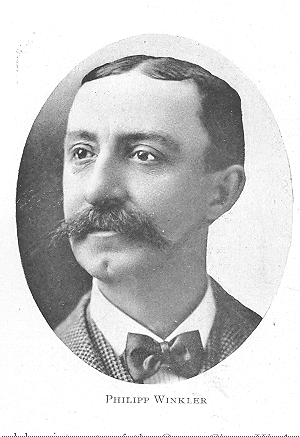
Philipp Winkler, Justice of the Peace of Hamilton County, is one of the most popular and best-known citizens of the Queen City. He is of good German stock, his father, Mr. Charles Winkler, having emigrated from Bavaria, Germany, in 1849, to the land of the free and the home of the brave. He settled in Cincinnati. Philipp was born in that city on the 18th of June,. 1864. The public schools of Cincinnati afforded him his educational opportunities, and when
- 583 -
but fifteen years of age he began his public career in the capacity of clerk in the office of the Corporation Counsel. He held that position for five years, and left the office to accept a position in the City Engineer's department, where it was his duty to examine the titles of real estate. In 1893 he was elected Justice of the Peace, and re-elected ever since by increased majorities, the best proof of his ability and popularity. Mr. Winkler is an active worker in the ranks of the Republicans of Hamilton County. He was married in 1888, and is the father of one child, a son. His residence is located at Fairview Heights, Cincinnati. Socially, Squire Winkler is a member of the Blaine Club, the Stamina Republican League, K. of P. and Ancient Essenic Order.
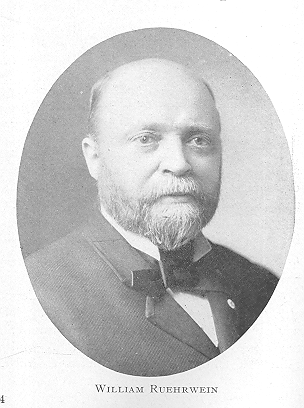
William Ruehrwein, The popular Superintendent of the Cincinnati Workhouse, has for many years been actively identified with the business and labor interests of the Queen City. His loyalty to the cause of labor has made him well known not only in the city, but throughout the State, and his appointment as Commissioner of Labor Statistics.by the late Governor Asa S. Bushnell was a recognition of long services in the interests of labor and capital, which Mr. Ruehrwein has struggled to bring into closer relations.
He was born on the 21st of February, 1840, and came to Cincinnati.as a boy. His parents were natives of Germany, and he has always been closely associated with the best German element of this city. His education was obtained in the common schools. Early he recognized the importance Of having some honorable trade, and learned one by which he earned a good living. for several years. His close application to his work merited and won for him promotions, and he remained in the employ of one concern fol.. thirty years, reaching a position as foreman. He became an expert mechanic, and always sought to better the conditions and surroundings of the workingmen in factories and elsewhere. His inclination in this direction induced him to make a special study of labor and capital, and no man in Cincinnati is better informed on the actual conditions existing between these elements. Mr. Ruehrwein has endeavored to
- 584 -
bring them into closer relations, and to a great extent has been successful.' He soon developed an active interest in politics, like all good German citizens, believing that politics is a part of real citizenship. He allied himself with the Republican party, and has been a constant worker for its interests since he was of legal age. His firstimportant:politicaroffice in this city was as a member of the Board of Education, to which office he was elected for several terms in succession. His work in behalf of educational interests was the same as in all other linesconstientious. He also served several terms as a member of the Union Board of High Schools. In 1893 he was nominated by the Republicans for the State Legislature and was elected, serving through the Seventy-first General Assembly with credit to himself and his constituents. He was renominated and re-elected, retiring on the 31st of March, 1896, to become State Commissioner of Labor Statistics, the appointment being a compliment unsought from Governor Bushnell. He resigned to become Superintendent of the Cincinnati Workhouse, a highly important position, and one to which he gives his whole time aiming to better the condition of the unfortunates who are compelled to spend their time working for the city behind closed doors. He was married in 186o, and is the father of eight children. Mr. Ruehrwein is a Scottish Rite member, a Knight Templar, Mason, an Odd Fellow, belongs to the Knights of Honor, and takes an active interest in the Protestant Reformed Church, to which he belongs. His home life is all that could be asked, he believing in domestic affairs and a happy family. His honesty is proverbial.
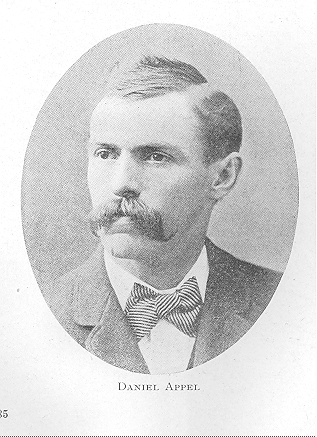
Daniel Appel, Of Cleveland, Ohio, a man who has acquired a National reputation by his inventive genius, was born on the 18th of July, 1850, at Neunkirchen, Rhenish Bavaria. His education was received in the elementary schools of his native country, until he had reached the age of fourteen, when he was apprenticed to a wood. turner at Kaiserslautern. During his apprenticeship Mr. Appel attended a trade school, where he took a special course in drawing and designing. In early youth he displayed a lively interest in constructive work, and his inventive genius at that time. first became apparent. After having become proficient in his trade he made a tour through the Rhine country. Returning to his home, he entered the machine works of Pfeifer, at Kaiserslautern, remaining there until 1869. In the latter year he emigrated to the United States and came to Cincinnati, there accepting a position in the machine factory Of KrUeger & Co. For two years Mr. Appel was employed with that firm, at the termination of which period he became connected with the Cincinnati Type Foundry. The Hall Safe & Lock Company was the next firth which employed him, his work there being the making 'Of the most exact tools for the manufacture of combination locks. It was during his stay in Cincinnati
- 585 -
that Mr. Appel made his first invention of importance, a machine which later revolutionized the paper bag manufacturing of the world. While the first machine was .not a financial success, owing to the fact that a system for distribution of the great output was not at that time perfected, it later became effective. In 1874, Mr. Appel removed to Cleveland,, where three years later he showed his plans to. Mr. Taylor, President of the Cleveland Paper Company, and received an order from him to build one machine. This machine had a capacity of turning out 18o bags a minute, and for the invention Mr. Appel became a shareholder in. the Eastern Paper Bag Company, an organization which was formed for the manufacture and distribution of the products of his invention. Mr. Appel's share in the business was represented by $35,000 worth of stock. Unfortunately for him, notwithstanding the great success of his invention, his entire. interest was lost, owing to the manipulations of those with whom he was connected. Not discouraged, Mr. Appel immediately commenced the perfecting of other machines on entirely different principles, and success crowned his efforts. He received patents for a number of others, and the latest machines made by him are now in use all over the world. His inventive genius has not been limited to this particular field of labor, for he has made a number of important inventions for astronomical purposes. Another of his inventions is in use to-day, in the hands of nearly every timer on a race track, an invention for an exact timing of speed, a watch-stopper. During the World's Fair in Chicago, Mr. Appel was the resident representative for the celebrated firm of Warner & SWasey in the exhibit of their instrumental department. At present he is consulting engineer for one of the largest Chicago manufacturing concerns. Mr. Appel during his leisure hours is often engaged in literary pursuits, and is a well-known contributor for, differ-ent scientific and trade journals. He is a married man and resides with his fainily on. Holyoke Street, Cleveland, Ohio.
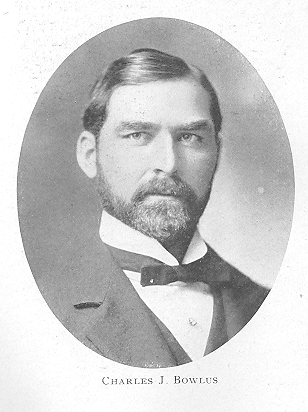
CHARLES J. BOWLUS, Chief Executive of the city of Springfield, Ohio, was born on the 17th 0f December, 1866. on a farm in Clarke County, Ohio. George C. and Barbara (Crabill) Bowlus were his parents. The father was a farmer and the son, in early life, worked .on the farm and acquired in healthful surroundings that rugged constitution which marks him to-day the man of sound physique and strong mentality. He was educated in the common schools of his native district during the time he was employed on the farm. Deciding, however, not to follow the career of his father, but to enter a mercantile life, in which he early showed an unusual ability, he took up his abode in Springfield, where he secured a position as clerk in a grocery store. Working for a number of years in that capacity, carefully saving his money, in 1888 Mr. Bowlus went into business by himself, and in 1897 associated himself with William R. Hackett under the firm name of Bowlus Fruit Company, doing a general corn-
- 586 -
mission business, with offices and storerooms located at 23 West High Street, Springfield, Ohio. This business has gradually and persistently expanded, until to-day it is the leading commission house of that city. In political life Mr. Bowlus is a strong and ardent Democrat, most pronounced in his views and emphatic in the expression of those .principles which he believes are right. That the people of Springfield had confidence in his executive ability is evidenced by the fact that in April, 1899, he was elected to the office of Mayor, which position he filled ably and to the satisfaction of the peciple for the term of two years. Appreciating the splendid record made by him during his. incumbency, he was again elected to that honorable office in 1903. In social circles Mr. Bowlus holds ..a prominent place in his community. He is a Mason, a K. of P., Elk, Commercial Traveler, a member of the Commercial Club, the Board of Trade, and a director of the Y. M. C. A. He also belongs to the Board of Directors of the Cincinnati Episcopal Hospital. On the 31st of March, 1887, Miss Fannie Lee Duvall, of Springfield, became his wife. Three sons and one daughter were born to the parents. The daughter lived only ten days.
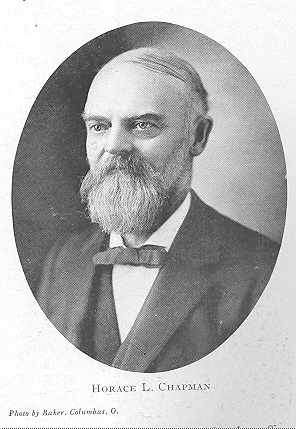
Horace L. Chapman, A plain 'business man, who has made a. success of 'everything he has undertaken; a man whose advice and views are always of value, and whose record bespeaks the confidence the people have in him ; who has never betrayed a. trust—such are the prominent features in the life of Horace L. Chapman. Mr. Chapman comes from good old English ancestors. They emigrated from England between 1633 and 1640. His .ancestors, some of them from both branches of the family, were in the Revolution and the War of 1812. His father and grandfather on both sides were farmers. Horace L. Chapman was born in the town of Independence, Allegheny County, New York, on the loth of July, 1837. He only had the advantages of a common school education. When but seventeen years of age he came to Ohio, and rode froth Columbus to Portsmouth in a stage coach, making the trip in a day, there being. no railroads at that time down the Scioto Valley. He at once embarked in business, engaged with his uncle, Horace Leet, in the lumber trade, where he remained until 1861. He then read law in the office of Colonel Oscar F. Moore, in Portsmouth, and was admitted to the bar in 1865; but never practiced his profession. In 1863 he went into the private banking business under the name of Kinney & Chapman. In 1865 he went to Jackson, Ohio, and established a private bank, converted the same into a- National in 187o, and became its. President, a:position he still holds. Later he engaged in the coal and iron business, and was connected with the building ,of what is now the Detroit Southern Railroad ; also'the Ironton Division of the C., H. & D. From 1861 to 1865 he was First Lieutenant of an independent rifle company in Portsmouth, Ohio. Mr. Chapman has always been a staunch defender of the Democratic faith,
- 587 -
and on several occasions been honored by his party. He was twice elected City Treasurer of Portsmouth ; member of the School Board and Town Council of Jackson for several terms, and refused to stand as the Democratic candidate for Congress when the district in which he resided was Democratic and he could have had the honor unopposed. In 1897 the Democratic State Convention that assembled in Columbus nominated Mr. Chapman for Governor. The outlook from a Democratic standpoint was poor. Governor Bushnell had been elected. in 1895 by 92,000 majority in round numbers, but the popularity of the Democratic candidate was such that he succeeded in cutting down Bushnell's majority .for a second term to 28,000. Mr. Chapman has been a district delegate to several Democratic National Conventions, and was one of the delegates-at-large from Ohio to the Kansas City National Democratic Convention in 1900. Some years ago Mr. Chapman removed with his family to Columbus, but he still owns a residence in Jackson, where he always votes and claims as his place of citizenship. He belongs to the various branches of the Masonic fraternity. For nearly forty years Mr. Chapman has been a prominent figure in the development of the material interests of the Jackson coal field as operator, iron manufacturer, banker and in general business, and his prominence in that regard is well deserved. He was among the pioneers who brought the attention of the world to the rich coal deposits in that section of Ohio, and invested his money and energy along the line of their disclosure. Mr. Chapman stands to-day as one of the foremost business men engaged in the coal trade.
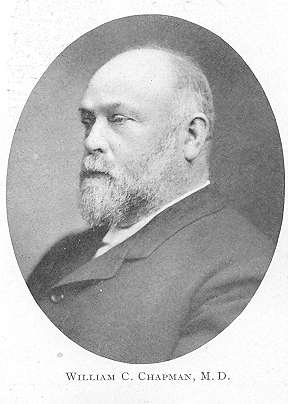
William C. Chapman, M. D., Of Toledo, Ohio, was born on the 15th of August, 1840, in Cincinnati. He is the son of Dr. M. B. Chapman, a leading physician and pharmacist .of the Queen City. His mother, Margaret Crossman Chapman, was the daughter of a prominent member of the Society of Friends in that city. Dr. Chapman received his early education in the public schools of his home city, and took an academic course in a private school of Charles E. Matthews. At the age of eighteen he directed his attention to the study of pharmacy under the preceptorship of his father, but three years later, in 1861, he entered the Ohio Medical College, taking a partial course of lectures, pursuing his studies under the preceptorship of Drs. William Clendenin and William H. Mussey. His course of study was for a time interrupted by rason of business engagements, but later it was resumed and in the spring of 1873 Dr. Chapman was graduated from the Miami Medical College of Cincinnati. After his graduation, Dr. Chapman took up his permanent home in Toledo, where his success has been marked, his practice being of a steady and healthy growth. For several year's Dr. Chapman wad a member of the Toledo Board of Health ; he is a member of the State Board of Health, and President of the Ohio Medical Association. On the 3d of March, 1863, he was united in marriage to Miss Harriet Mitchell, daughter of
- 588 -
Mr. Jethro Mitchell, of Cincinnati, by which union he is the father of five sons. In religious faith, Dr. Chapman is a Presbyterian, and has been for many years an Elder of that church in his home city.
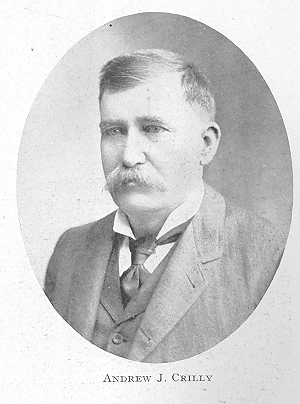
Andrew J. Crilly, Chief Executive of the city of Newark, Ohio, and a leading Democrat in the central part of Ohio, was born on the loth of July, 1848, in Union Township, Licking County, Ohio, His father was a laboring man, and a native of Pennsylvania, his mother coming from Virginia. The family on both sides are of Irish ancestry. Mr. Crilly was educated in the common schools, and at the early age of sixteen was compelled by force of circumstances to earn his own living. He started in life as an ordinary laborer, but by careful and assiduous study educated himself sufficiently to obtain the position of school teacher, which occupation he followed for a period of ten years. In 1883 he was appointed Deputy Sheriff, which position he held for over four years, when, in 1887, he was appointed Sheriff of Licking County for the unexpired term of Sheriff Brown, who had resigned. To this office he was elected by the people in 1888. From 1893 to 1896 Mr. Crilly was engaged in the real estate business, and in 1897 was elected Justice of the Peace. This office he occupied for a period of five years. In 1903, when the new code of the cities of Ohio became effective, Mr. Crilly was elected Mayor of Newark on the Democratic ticket. He has been a staunch supporter of Democratic principles all his adult life. Mr. Crilly is a man of strong convictions, great energy and forcefulness of character. He is genial, a „good fellow and has a multitude of friends. Socially, he is a member of the Masons, Eagles, I. O. O. F., K. of P., Modern Woodmen of the World, and has often been a delegate to State and District Conventions of the Democratic party. He also has been honored with the Chairmanship and Secretaryship of Executive Committees numerous times. Mayor Crilly is a married man, and the father of four daughters and two sons. His residence and offices are located in the city of Newark, Ohio.
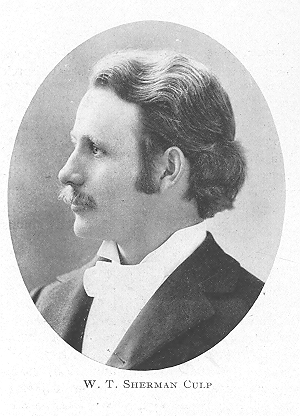
W. T. Sherman Culp, Of Cleveland, Ohio, was born on a farm near Richmond, Jefferson County, Ohio, on the 12th of May, 1866, and was the third son of Samuel Culp and Harriet Wright-Culp. His parents on his father's side were descendants of Baltzer Culp, who, with his brother, came to America from Hanover, Germany, before 1800 settling in Pennsylvania, but later coming to Jefferson County, Ohio, locating but a few miles from the old blockhouse fort not far from Wellsville, Ohio. His mother was of English ancestry, who for a time settled in Maryland, and as early pioneers helped to blaze the trails throughout the Eastern part of the
- 589 -
State. With a lineage rugged and successful, Mr: Culp received from parentage and farm life a vigorous body and mind. He attended the country school until sixteen years of age, when he entered Richmond College, Richmond, Ohio, .arid spent a year and a half there. Then, matriculating at Mt. Union college, Alliance, Ohio, he completed the classical course, graduating as Latin orator in the class of 1888. In college he was distinguished by proficient work in the class-room, and was the, best orator of the class: After graduation he was Superintendent of the High School at Eding.burgh, Ohio, one year, and in September, 1890, entered the ministry of the Methodist Episcopal Church, joining the East Ohio Conference. Since then he has filled charges at Hanover, two years; Akron, two years ; Mantua, three years ; Madison; four years, and Ashtabula, five years. Soon after his graduation his services were 'sought for in public work, and he entered the lecture field, where he has won distinction and is constantly in derriand; his 'Uncrowned Kings" having been given a thousand times. His A.M. was received from Mt. Union College, and Ph.D. and D.D. from Richmond College, at Richmond, Ohio. In September, 1887, he was married to Tinetta Davis, of Mt. Union, Ohio, and to them were born two children, Ruby and Miriam. While pastor at Madison, Ohio, in 1899, his wife died, beloved by all the people. On the l0th of January, 1904, he was united in marriage to Jeanette Upton, of Madison. Dr. Culp is a., deep thinker, aggressive in plan and action ; endowed with unusual executive powers, and has distinguished himselfin the building of churches and in directing business affairs. Magnetic, practical, genial and kind, he enjoys the respect and confidence of his fellow citizens.
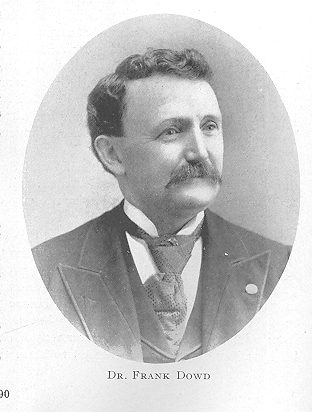
Dr. Frank Dowd, Cleveland, Ohio, is by profession a dentist, located in the Schofield Building, corner of EuClid Avenue and Erie Street. He vas born in Chautauqua County, New York, on the 23d of September, 1847, and is a son of Benjamin and Rhoda Dowd. The former iyas born. in Rutland, Vermont, and the latter in Cazinovia, New York. The father, a carpenter, eon' tractor and builder, came froth Vermont to
- 590 -
Allegheny County, New York, in 1824, mov:ng from thence to Mainsburg, Tioga County, Pennsylvania, and from :there to Chautauqua County, New York, in 1837. He was a pioneer in his business in that part of the State, and was a member Of the Baptist Church for many years, dying at the age of seventy-one years. He was a useful Man, extensively known and highly respected as a most worthy citizen. As a skilled workrrian in his line, no less than as an honored, representative citizen, his death was Mourned as a loss to his, family, the community and to the church of his choice. His father, Zina Dowd; took part as a faithful soldier in the Revolutionary War. Zina Dowd was one of. three brothers who came from England to Vermont in the latter part of the eighteenth century, and the whole Dowd race in the United States are fruit from these trees. Our subject's mother died at the home of her son in Cleveland, Ohio, on the 13th of March, 1904, at the age of ninety-one. She was a lifelong member of the Baptist Church. She bore her husband. eight children, among them Thurzah L., widow of Chester Tanner, a prominent farmer of Chautauqua County, New York, and William E. Dowd, deceased, for a number of years a resident of.Erie, Pennsylvania, serving faithfully the people in the capacity of mail carrier, and was honbrably discharged after three years of faithful service in the Civil War, as a member of. the Seventy-second Regiment of New York, in Company B, from Jamestown, New. York. The gentleman whose name introduces this sketch was educated in Panaina, Chautauqua. County, New York. At his majority he entered into partnership with his father. as a contractor and builder and remained as such until the death of his father, in 1875, when he immediately took up the study of dentistry and began the practice of his chosen profession without anything but formal knowledge of the work. He opened an office in Jamestown, New York, and was successful from the very beginning, in three years working up the largest practice in Jamestown. Feeling the need of being in good standing in the profession, he entered the.Indiana Dental College, at Indianapolis, Indiana, where he was a demonstrator of bridge and crown work for the college. Dr. Dowd is a graduate from that college. He came to Cleveland in 1885. He is a skilled. workman of much natural genius, and is classed among the best dentists of the country, is thoroughly posted in his profession, progressive in his views, and in every way a good and enterprising citizen. Socially, Dr. Dowd is .a member of the Uniform. Rank of the Knights of. Pythias, and.is Colonel on the staff of Generale James R. Carnahan, who is Major General commanding the Uniform Rank of the Knights of Pythias of the world. He has by his wife, Mary A. Campbell, a daughter, Cora, married Dr. Frank Olds, a successful practitioner of dentistry in Toledo, Ohio, and Herbert H. Dowd, who was born in Cleveland, Ohio, in 1880.
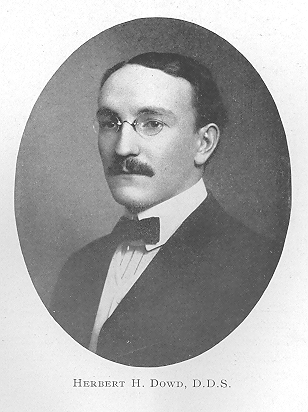
Herbert H. Dowd, D.D.S., At Cleveland, Ohio, the son of the well-known and popular Cleveland dentist, Dr. Frank Dowd, was born in the Forest City on the 12th of August, 1880. He received a care-
- 591 -
ful literary education in the public schools of his home city, after which he decided to enter the same profession in which his father has made such a marked success. For this purpose Mr. Dowd attended the dental department of the Western Reserve. University, from which famous institution he graduated on the i6th. of June, 1904, receiving the degree of D.O.S. Immediately after his graduation, Dr. Dowd opened an office at No. 5o Euclid Avenue, Cleveland,-where he already has built up a good practice. He undoubtedly is one of the most popular of the younger dentists of Cleveland, Ohio. Dr. Dowd has inherited a military spirit from his father. When the war with Spain broke out, he enlisted in Company C of the Fifth Ohio Volunteer Infantry. He was mustered in on the 8th of June, 1898, and with this regiment he saw service until the 5th Of November, 1898, when he .received an honorable discharge., On the 24th of May, 1899, Dr. Dowd entered Company C of the Fifth O. N. G. Regiment, remaining with that military body until the 28th of August of the same year, when he enlisted in the United States service, joining Company K of the Sixth United States Infantry. His regiment was dispatched to the Philippine Islands, and he took part in numerous expeditions and skirmishes on the Island of Paney. He remained in the Philippines for a period of. two years and six months, in active duty, and on the 27th of August, 1902, was mustered out, he then being Color Sergeant. Returning to his home city, he then took, up the study of dentistry, with the above mentioned result.
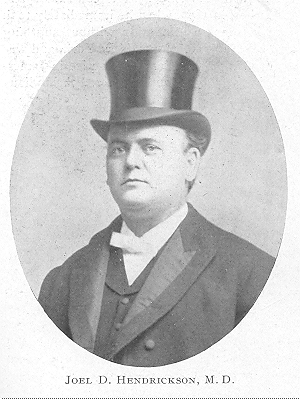
Joel D. Hendrickson, M. D., A well-known physician of Portsmouth, Ohio, was born on the 1st of July, 1865, at Tolesboro, Lewis County, Kentucky, and is the son of Daniel and Elizabeth Rummann Hendrickson. His mother is a descendant of Daniel Boone, the famous frontiersman. His paternal great-grandfather, O. K. Hendrickson, was a Hollander, and served as First Lieutenant in the Continental army during the American struggle for independence. His father, Daniel Hendrickson, was. Captain of the Forty-fifth Kentucky Infantry and lost his life in the War of the Rebellion, and is supposed to have been drowned in the Red River, Louisiana. The boyhood of Dr. Hendrickson was passed in Tolesboro, Kentucky, where he attended school. At the age of twelve years, he was compelled to help sustain his family, and he became employed in a grocery store. However, he continued his studies at home, and saving his money carefully, he was able, at the age of fourteen, to enter Lebanon College, where he prepared himself to teach school. He followed the occupation of teaching in winter and went to school during summer, until he graduated, after taking a scientific course. Dr. W. H. Campbell, of Vanceburg, Kentucky, then .gave him special instructions in medicine, and he later entered the Kentucky School of Medicine, at Louisville, from which institution he graduated in 1894, receiving the degree of M.D. He then came to Ohio, in 1895, in which State he has made
- 592 -
his permanent residence ever since, Desiring to take a special course in electro-therapeutics, he attended the Illinois School of Electro-Therapeutics, and became a graduate from that institution. Dr. Hendrickson is the first physician in Ohio who successfully applied the great discovery of Roentgen for the cure of cancer. His patient was H. Hiram Davis, of Greenup, Kentucky. He also discovered and proved the fact that the X-rays could remove albumen and tube cast from kidneys in Bright's disease, and he also was quite successful in treating tuberculosis with the light of the X-rays. On the 12th of February, 1893, Dr. Hendrickson was married to Mattie Clark Blanc, and three children have been the issue of this union. Dr. Hendrickson resides and practices in Portsmouth, Ohio.
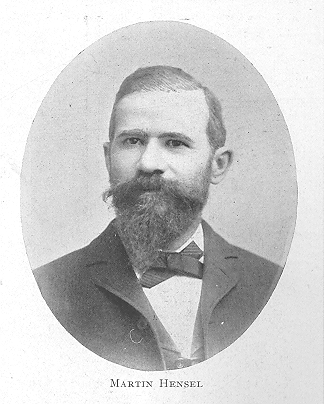
Martin Hensel, Librarian of the Columbus Public School Library, was born at Columbus, Ohio, on the 25th of January, 1843. He received his education in the Columbus Public Schools, the first four years exclusively German ; entered the High School, but did not quite complete its course. In 1862 Mr. Hensel entered the army as a member of the One Hundred and Eighth 0. V. I., served under Generals Thomas, Grant and Sherman in the West and South, and was at the front when General Johnston surrendered to General Sherman in North Carolina. He attended the great review at Washington in May, 1865, after which he was mustered out of the service, and was honorably discharged. Returning home Mr. Hensel entered the book business under Mr. Joseph H. Riley, and continued therein with Messrs. Gleason and Twiss until 1890, when he accepted the position of private secretary to the Superintendent of the United States Coast and Geodetic Survey, at that time Dr. T. C. Mendenhall. Upon the resignation of the latter in 1894, Mr. Hensel entered the service of the Smithsonian Institution at Washington, which position he left at the close of 1895. In October, 1896, he was elected Librarian of the Public School Library at Columbus, Ohio, to succeed, the late Mr. Spielman. Since then he has been actively engaged in library work. He has seen the library grow from 30,000 volumes to 60,000, an increase of Too per cent ; while the service of the library has grown from 120,000 issues to more than half a million, an increase of over 400 per cent, during that time. The library in question is both a public and a school library, and its operations necessarily cover a wide field, while its management requires unusual care.
Marion W. Hissey, Of Zanesville, Ohio, one of the leading financiers and manufacturers of the State, is closely identified with the development of his home city. He is President of the Union Machine Works, a large and flourishing enterprise of Zanesville, and is Vice President of the Commercial Bank of the same city. Being a public spirited man, of broad human
- 593 -
sympathies, he has always taken an active part in all movements for the betterment of the community in which: he resides, and is looked upon as one of the most foremost and influential citizens of. Zanesville. Notwithstanding his large commercial and financial interests, Mr. Hissey has found time to become a leader in the political affairs cf Ohio, and, being a Republican all his life, has rendered invaluable services to his party. These services have been recognized by the foremost Republicans in the country. He has been a warm personal friend of the immortal McKinley and the late United States Senator M. A. Hanna. Always active in State politics, he was a Member of different Executive and State Central Committees, as well as a delegate to State and National Conventions. He is a married man, and lives with his family at No..131 O'Neil Avenue, Zanesville: His factory is located on Putnam Street, and the Commercial Bank at No. 502 Main Street, that city.
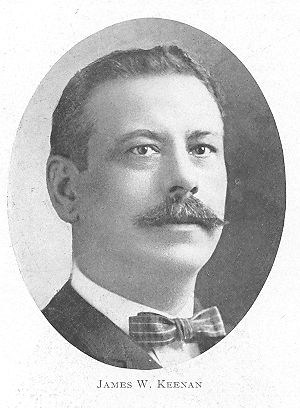
James W. Keenan, A member of the City Council of Cincinnati, Ohio, and a man whose name will be remembered: by thousands as one of the great baseball players of the Cincinnati team, "the Reds." He is a native of New Haven, Connecticut, born in 1858. His education was obtained in the public and High Schools of his native city, as well as in college and commercial institutes. When eighteen years of age he joined the ranks of the baseball profession, and for fifteen years continued in that occupation with splendid success. During that time Mr. Keenan was considered one of the most able and efficient men in the baseball world, and largely through his efforts the "Reds" gained a National reputation. Since 1885; Mr. Keenan has permanently resided in the city of Cincinnati, in which, since 1891, he is engaged in business. Mr. Keenan is a man who has a large following of personal friends and is widely known 'in social circles, being a member of the K. of P., Eagles and the Knights of Fidelity. In political belief, Mr. Keenan is an uncompromising Republican of most pronounced views, and is a member and director, of the Blaine Club and a member of the Stamina Republican League, two of the most powerful political organizations in the United States.- Since 1897 he has been continuously a member of the Cincinnati Board of Legislation, and during all that time he has served the people well and faithfully. He is married since 1886, and resides with his family at Liberty Street and Freeman—Avenue, Cincinnati, where also his place of business is located.
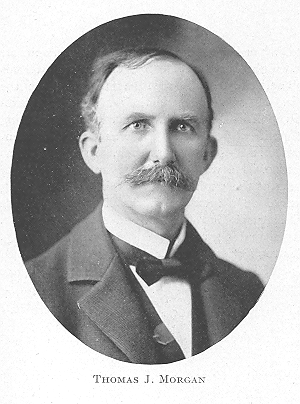
Thomas J. Morgan, A prominent coal operator in the Jackson coal fields, located at Wellston, Ohio, was born on the 4th Of December; 1846, at Keystone, Jackson County, Ohio. He is of Welsh descent, both parents—John E. Morgan, a farmer, and Mary Jones Morgan—coming to
- 594 -
this country from Wales in 1841. Mr. Morgan received his education in the common schools of his native district, at Ewington Academy, and at Nelson's Commercial School at Cincinnati, Ohio, from which institution he graduated. When a boy Mr. Morgan worked on a farm ; later he was engaged as a bookkeeper. Mr. Morgan occupies a very prominent position in the industrial and mercantile. life of the part of the State in which he resides. He is interested in many coal companies, lumber companies, telephone and banking institutions, in many of which he holds an executive position. He is director and manager of the Wellston Coal Company, the Milton CoalCompany, the Dayton Coal and Iron Company, of which he is also President ; the Raleigh Coal and Coke Company, of which he is President and Treasurer, and the Raleigh Lumber Company. He is director of the First National Bank of Wellston, Ohio, and also is interested in the First National Bank of Chillicothe. In the Home Telephone Company Mr. Morgan is largely interested, and belongs to the Board of Directors of that corporation. In politics he is a Republican from the ground up, and is always active in the interests of his party when necessity demands, although he never occupied any political position. He is a thirty-second-degree Mason and a member of the Elks. Mr. Morgan has an enviable record for service in the Civil War, and was a private in Company D, One Hundred and Seventy-ninth O. V. I., enlisting in August, 1864, and was discharged at the termination of the war, in June, 1865. On the 24th of March, 1875, he was united in marriage to Nancy M. Poore. The union has been blessed with two children, one son and one daughter. He is a member of the Methodist Episcopal Church of his city. His offices are located on Broadway, Wellston, Ohio.
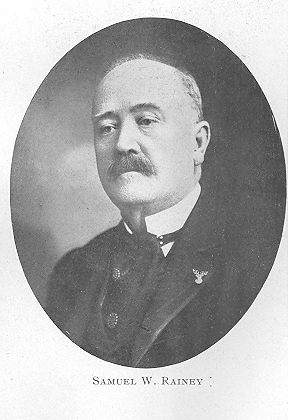
Samuel W. Rainey, Mayor of the city of Lancaster, Ohio, was born on the 6th of November, 1842, in the city which has honored him with the first position in the gift of his people. He is the son of John C. and Mary E. (Darst) Rainey, both natives of the United States. His father was born in Pennsylvania and his mother in the State of Virginia. He receiVed a common school edu-
- 595 -
cation up to the time he was nineteen years old, when he was impelled by an uncontrollable desire to enter the ranks of the Union army and fight for his country, culminating in his running away from the school and home and enlisting in the army as a privafe in the Seventeenth Ohio Infantry, in February, 1862. He served during the war, and was mustered out and honorably discharged in 1865. In politics Mr. Rainey has been a lifelong Democrat, and has occupied many important political positions. He was elected a member of the City Council in 1877 and served two terms of two years each. In 188o he was appointed real estate appraiser, and again in 1890. He was elected Mayor of the city of Lancaster in 1881, and re-elected to a second term at the expiration of his first term, having served with marked distinction. In 1884 he served as a member of the Democratic State Central Committee. In 1889 he was appointed Natural Gas Trustee and served One year. He was elected as a member of the City Council in 1894, and served two years. In 1903, when the new code for the Ohio municipalities took. effect, Mr. Rainey was again honored with the election to the office of Chief Executive of Lancaster, an office he fills to the entire satisfaction of the people. Mr. Rainey is a member of the B. P. O. E. and the Union Veteran Legion. He was formerly special agent for the Central Union Telephone Company. In June; 1866 he was united in marriage to Mary A. Koontz, and is the father of seven children, as follows : Ida M., Harry, John C., Gertrude, Clem, George H. and Edith Rainey, the mother of whom died in April, 1888. In 18 92 he married Amanda 'E. Hayes. Mayor Rainey was raised a Presbyterian. He resides with his family at No. 586 East Main Street, Lancaster, Ohio.
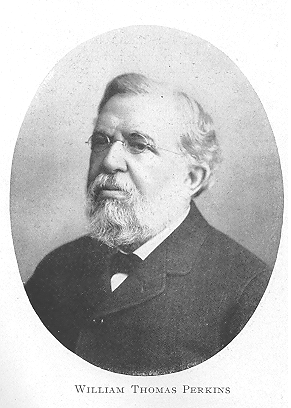
William Thomas Perkins, Auditor of the city of Cincinnati, was born in Xenia, Ohio, on the 8th
of December, 1834, and obtained his education in the Xenia Academy and the public and High
Schools of Cincinnati. He came to this city when a mere boy and began business life as an errand
boy for a dry goods house at $1 a week. That was in 1845. He next became a clerk in a white lead
concern, and was subsequently a clerk in the banking house of W. S. Groesbeck & Co. In 1862
Mr. Perkins went into banking for himself. Two years later he went to Knoxville, Tennessee, and
founded the First National Bank of that city. He afterward returned to Cincinnati and became
cashier of the old Central National Bank. Closing out Mr.. Perkins went South and became a
cotton planter, but he again returned to Cincinnati and was a newspaper man, connecting himself
with the old Times-Chronicle, the forerunner of the Times-Star. He was local and editorial
writer, and later Washington correspondent. Under W. E. Davis, Mr.Perkins was Assistant
United States Sub-Treasurer, remaining for a time under A. W. Stem. This position Mr.
Perkins resigned to enter the grocery firm of John J. Perkins & Co., and on the 1st of Janu-
- 596 -
ary, 1891, became a partner in the firm, and nas since been active in the management of the concern's affairs. Always a Republican, Mr. Perkins has taken an interest in local politics. In 1856 he was a loyal supporter of Fremont, and was made Secretary of the first, Young Men's Republican Club of Cincinnati. His first political office came when he was appointed a Fire Trustee by Mayor John B. Mosby, on the 4th of May 1893. He has since taken an active interest in municipal and political affairs, and when Paul M. Millikin resigned from the office of City Auditor to become Chief of Police, Mr. Perkins was appointed to fill the vacancy. Mr. Perkins demonstrated his fitness for the position, and was nominated by the Republicans for election. He headed the ticket which was elected in the spring of 1903. His administration of the office of Auditor has been exceptionally clean, he carrying into the office his strict 'business principles, demanding of all his subordinates their full duty to the city. Mr. Perkins has been a director of the Young Men's Mutual Life Association, of Cincinnati ; was President of the Merchants' and Manufacturers' Association of Cincinnati and Hamilton County, and served for years as the executive head of the American District and Telegraph Company. He has held numerous other positions of trust, always being faithful and pain-staking.
He was married to Miss Sallie E. DeCamp, daughter of Hiram DeCamp, on the 3d of May, 1859. There were born to them four children, but only one, a son, George,. now engaged in business in St. Louis, Missouri, survives. The Perkins homestead is on East Walnut Hills.
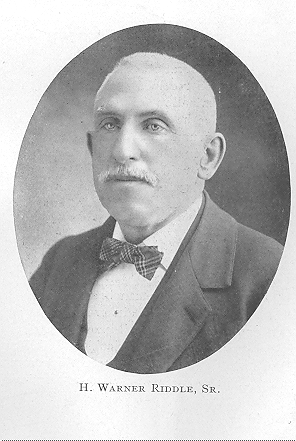
H. Warner Riddle, Sr., A large coach and hearse manufacturer of Ravenna, Ohio, was born on the 8th of February, 1838, at Pittsburg, Pennsylvania. His father, Hugh Riddle, was a well-knowncontractor and a native of Ireland, of Scotch-Irish descent, while his mother, Elizabeth Thornberg, born in Pennsylvania, was of German stock, and whose ancestors lived for many, generations in this country. Mr. Riddle received a common school education, and at the early age of fourteen years he was apprenticed to a manufacturer of carriages in his home city, and remained in this position for four years. After completing his apprenticeship he went to Cincinnati, where he was employed until 1860, thoroughly acquainting himself with all the details of the business, which he has continuously followed all is life. In 1860, deciding to enter into business of his own, he .settled ajt Ravenna and formed a partnership with Mr. Charles Merts under the firm name of Merts & Riddle. This partnership lasted until 1890, when The Riddle Coach and Hearse Company was organized, which concern at the: present writing employs a large force of ,skilled mechanics. Mr. Riddle is the President of the Company which bears
- 597 -
his name, and associated with him are his two sons, his son-in--law and a nephew, all of whom are partners in the enterprise founded by him. He is the owner of many buildings in his chosen city, and is looked upon as one of the leading and most public spirited citizens of his community. He was married in 1866 to Emily H. Robinson, and is the father of four children, two sons and two daughters.
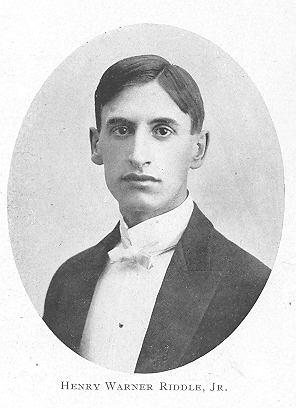
Henry Warner Riddle, Jr., Chief Executive of the city of Ravenna, Portage County, Ohio, and associated with his father, one of the leading carriage and hearse manufacturers of the United States, has the distinction of being one of the. youngest Mayors ever elected to that position in any Ohio city. He was born September 4th, 1880, in the city which has distinguished him. His parents, H. W. Riddle, Sr., and Emily H. Robinson Riddle, were both native Americans. Mr. Riddle, Jr., received a very careful education, and passed through all the grades of the Ravenna public school, after which he attended Hudson Academy at Hudson, Ohio, and Peekskill Military Academy at Peekskill, New York. At the age of twenty-one he started in active life in the business of his father, being now a member of the firm. In political belief, Mr. Riddle is a convinced Democrat, and takes a leading part in the political life of his community. He is a member of the Democratic County Committee. In April, 1902, he received at the hands of his party the nomination for Mayor of Ravenna, to which office he was elected. His services during his incumbency of office thoroughly satisfied his constituents and the people in general, and as evidence of their appreciation he was returned to the same office in the spring of the following year. Socially, he is a Mason and K. of P. His residence is located in Ravenna, Ohio.
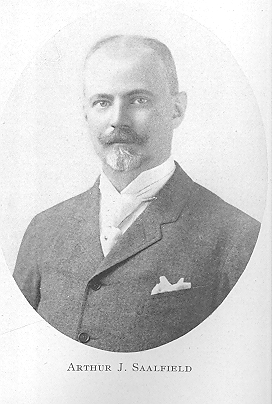
Arthur J. Saalfield, The city of Akron can boast of no enterprise rebounding more to its credit to-day than the flourishing and well-known publishing house conducted by The Saalfield Publishing Company. The man who made the company in the raw ; the man who alone is responsible
- 598 -
for its phenomenal growth and prosperity, who is in fact the company, although conducting the business under the corporate name, is Mr. A. J. Saalfield, than whom there is no one more thoroughly successful in his line of business in the States to-day.
Mr. Saalfield is an Englishman characterized by that singular business sagacity that has made so many of his countrymen on both sides of the Atlantic famous in the commercial world. He was born at Leeds in 1863, and can boast some of the best blood of England in his veins. His father, besides having other extensive interests, in. Great Britain, was a banker of considerable renown ; but Mr. Saalfield, being :the youngest son of a large family, and unusually ambitious, preferred to carve his own way independently in a newer country. Coming to the States, he made his first home in New York City, later going to Chicago, but ultimately returning to the metropolis— gradually and indefatigably pushing towards the one object in view, the establishing of .a publishing house unsurpassed by any in the country. The book business was the profession he chose early in life ; and by his far-seeing method of procedure—always working under the best 'men, gaining experience along every line of the business, making his, way through every department, from the lowest to the highest—his ambition seems now in a fair way to be attained.
Mr. Saalfield began business for himself in New York while yet a very young man. Only seven years ago he came to Akron to assume the management of the publishing department of The Werner Company. The following year he purchased this branch of the business. To-day The Saalfield Publishing Company—although in its infancy—is, owing to the unremitting energy and unusual capabilities of one man, a power to be reckoned with in the publishing world, growing rapidly and steadily.
Personally, Mr. Saalfield is exactly what one would expect from an Englishman of good birth, good breeding and excellent education, added to a keen business ability : alert in action, agile in mind, and with a rare energy and power necessary to create the business of which he is the heart and soul. He is courteous always, and genial, with a kindly eye which holds a cheer and sparkle that all the years of hard work and responsibility have not been able to quench. His jaw and mouth denote a will of steel. Absolutely thorough himself, he is intolerant of any remissness of those around him in his business life, but consideration and kindness itself to those who serve him faithfully.
In 1885 Mr. Saalfield was married to Miss Adah Sutton, of New York, daughter of the Rev. George Sutton. Mrs. Saalfield is a beautiful woman, of marked literary ability. Their children, five in number, are as charming and interesting members of Young America as can be found anywhere.
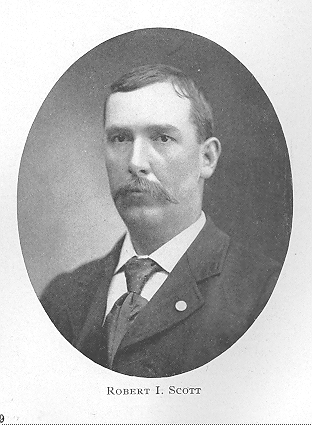
Robert I. Scott, Chief Executive of the city of. Steubenville, Ohio, was born on the 13th of January, 1860, in the community whose .citizens have honored him with the' election to the highest municipal
- 599 -